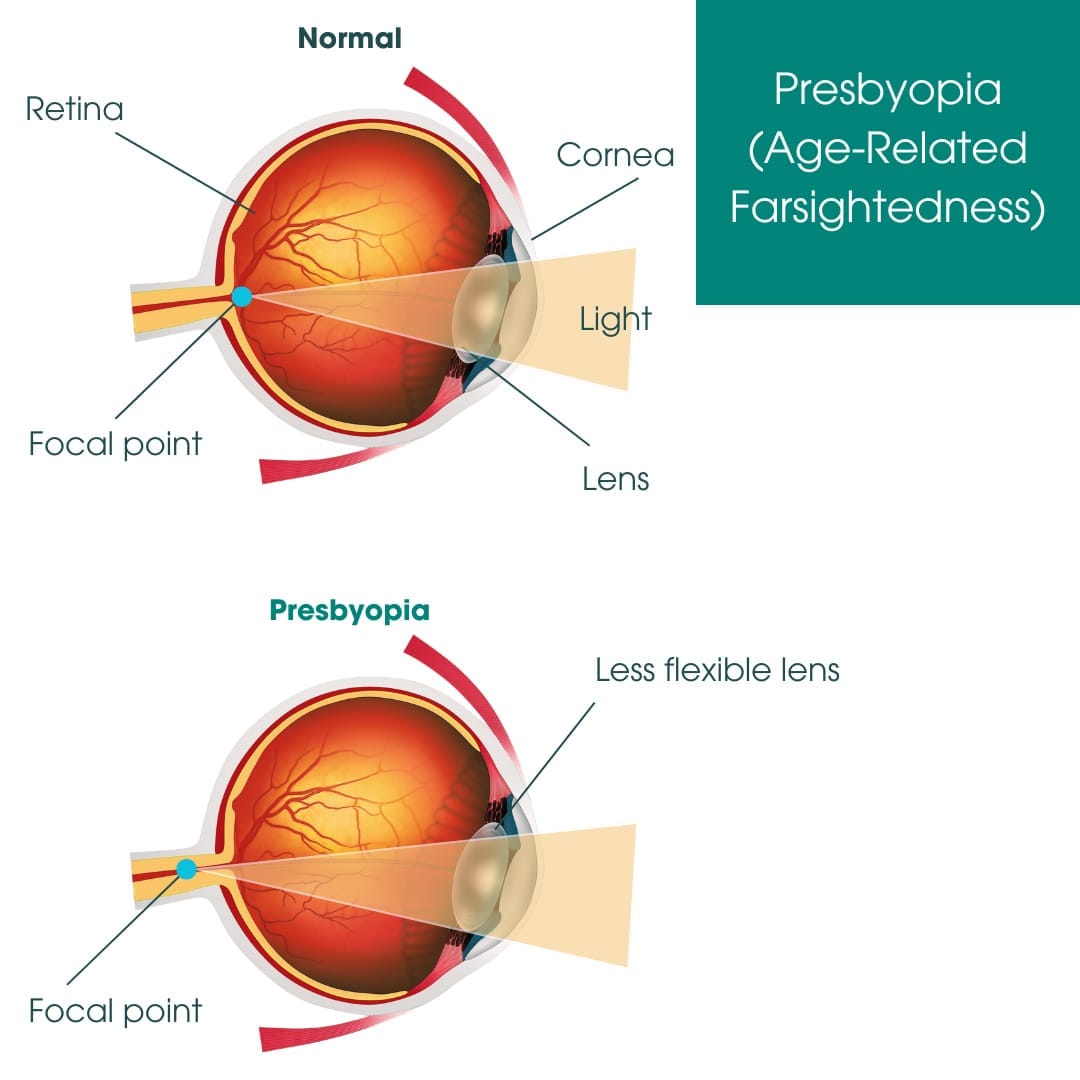
Presbyopia is a common version of farsightedness that usually begins around the age of 40. If you have farsightedness that’s not caused by age, it’s called hyperopia. Presbyopia is caused by the gradual hardening of the lens inside the eye, which makes it difficult to focus on objects that are close. Your sight is a delicate balance of myriad parts that all must be in perfect working order to be able to see. As you age, your eyes also get older.
Some of the more common symptoms of presbyopia include:
When the symptoms of presbyopia occur earlier than usual, it’s called premature presbyopia or early onset presbyopia. This is caused by environmental conditions like high average temperatures, toxic substances, nutritional deficits and UV radiation.
Presbyopia is a natural part of the aging process and there are several treatment options. To find the best choice for you, Eye Physicians in NYC have the best optometrists and presbyopia specialists eager to help you understand your alternatives and make an informed decision regarding your presbyopia treatment.
While age is the most common risk factor for this condition, there are other reasons that you may develop premature presbyopia. And although you may have one or more of these risk factors, it doesn’t mean you’ll develop the eye disorder.
But you may develop premature presbyopia if you have:
The good news is that presbyopia itself is not life threatening and can easily be remedied in most cases. If left untreated, it may have an adverse effect on your lifestyle, however. You need good vision to be able to navigate through life productively. If you’re having trouble with your vision, call Eye Physicians right away. Make an appointment where you can be in and out in less than an hour.
Presbyopia is a part of the natural aging process, so there’s no way to stop it. Your eye lens gradually loses flexibility, making it more and more difficult to focus on things that are close. You can help yourself by taking good care of your eye health.
To maintain eye wellness and reduce the need for presbyopia treatment, take steps such as:
While these things won’t cure or lessen your farsightedness, you will know that you’re doing everything you can for your eye health and overall well-being. If you begin to notice eye strain or difficulty focusing, it’s important that you find a presbyopia specialist who offers the best treatment for presbyopia. Your eyes are invaluable and deserve your full attention and concern.
The best treatment for your presbyopia is a decision that needs to be made by you and your doctor. While an obvious treatment is prescription eye wear, or even cheaters from your local department store, there are more choices now than ever. Some of the outcomes are permanent and others may age as you do.
Presbyopia treatment can include options such as:
The latest treatment is prescription eye drops that improve your near vision temporarily. These drops — pilocarpine ophthalmic — temporarily constrict your pupils to give you sharper vision. While they may give you better sight for a while, they aren’t meant to be a permanent replacement. It’s always recommended to see a vision specialist for a proper exam and diagnosis.
There are laser treatments for your age-related farsightedness. While they do help you see up close, they don’t stop or cure presbyopia because it’s an aging process. LASIK and PRK both use a laser to sculpt the cornea to a more suitable shape.
The popular surgeries may have some minor side effects that include:
Risks are greatly reduced when you undergo presbyopia surgery at Eye Physicians. There, your presbyopia specialists determine whether you’re an appropriate candidate for presbyopia laser treatment. Certain medical conditions like autoimmune disorders or dry eyes syndrome can increase the risk of complications. Pregnancy, breastfeeding and other hormonal changes also can affect outcomes, which is why it’s imperative to rely on the best ophthalmologists in New York City at Eye Physicians to perform your presbyopia laser treatment.
The good news is that presbyopia worsens only until about the age of 65 and there are many helpful treatments available to you to reduce its effects. While most people may experience stable vision after a laser procedure, these treatments don’t stop time and eyes change over time.
If your eyes still have time to change, or you have a medical condition that would keep you from having presbyopia laser treatment, prescription eyeglasses or contact lenses may be the answer for you. With the prices going down and options on the rise, contact lenses have been making a statement as unique as eyeglasses.
Glasses remain the least invasive and come in a variety of options, including:
Treatment for presbyopia is a personal decision for you and your eye doctor to make together. To be sure that you have the best ophthalmologist in NYC, contact Eye Physicians in New York City. Dedicated, personable doctors and staff help you get answers to your vision concerns. Regular visits to your eye care professional are imperative to supervise the health of your precious eyes.
Eye Physicians
110 Lafayette St, Suite 503
New York, NY 10013
(212) 292-4814
Entrust the care of your precious eyesight to highly skilled and experienced eye care professionals. For top-notch ophthalmologists and optometrists in Downtown Manhattan, choose Eye Physicians. Eye Physicians ensures prompt care, precise diagnosis, and personalized treatment plans.
Schedule an Appointment